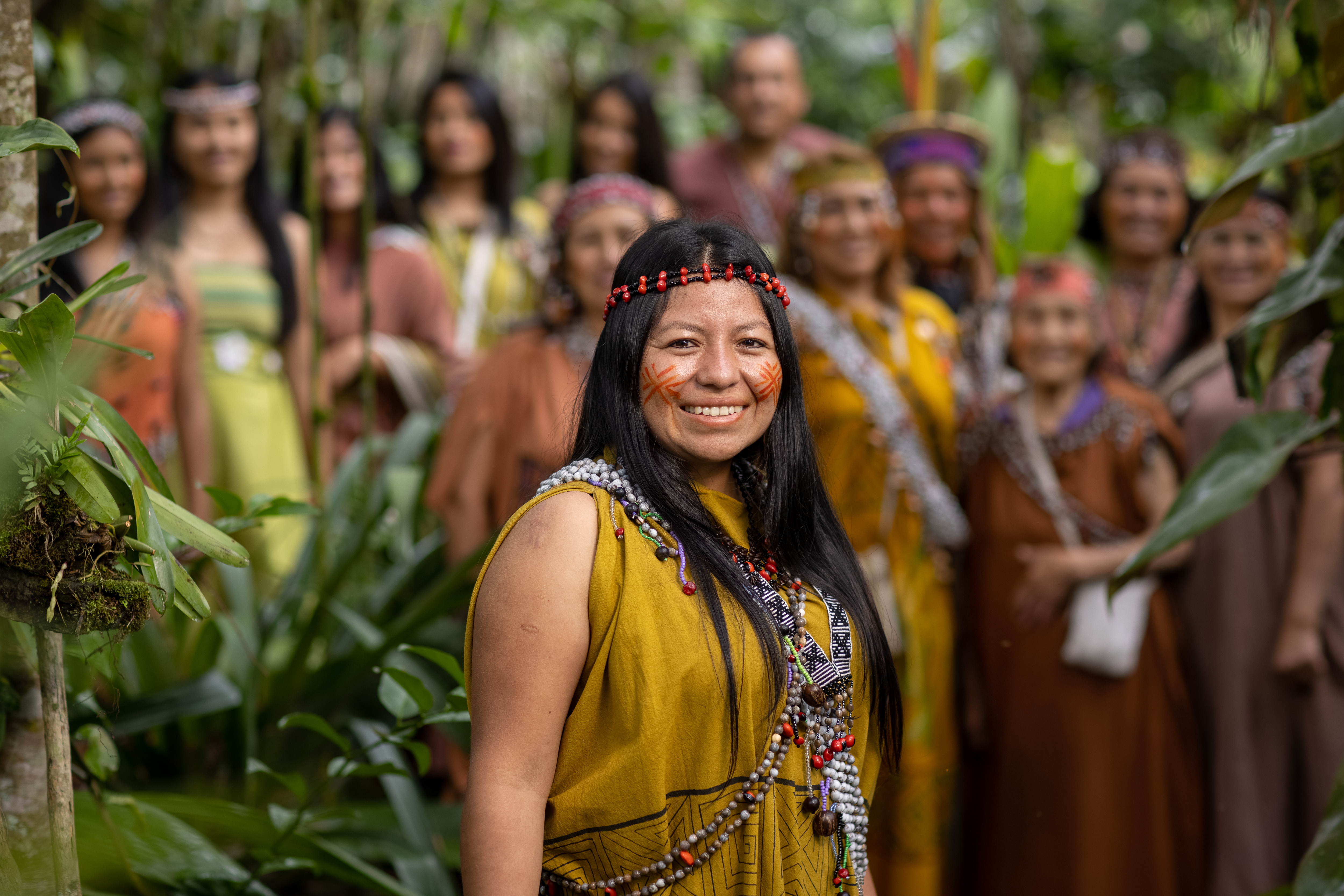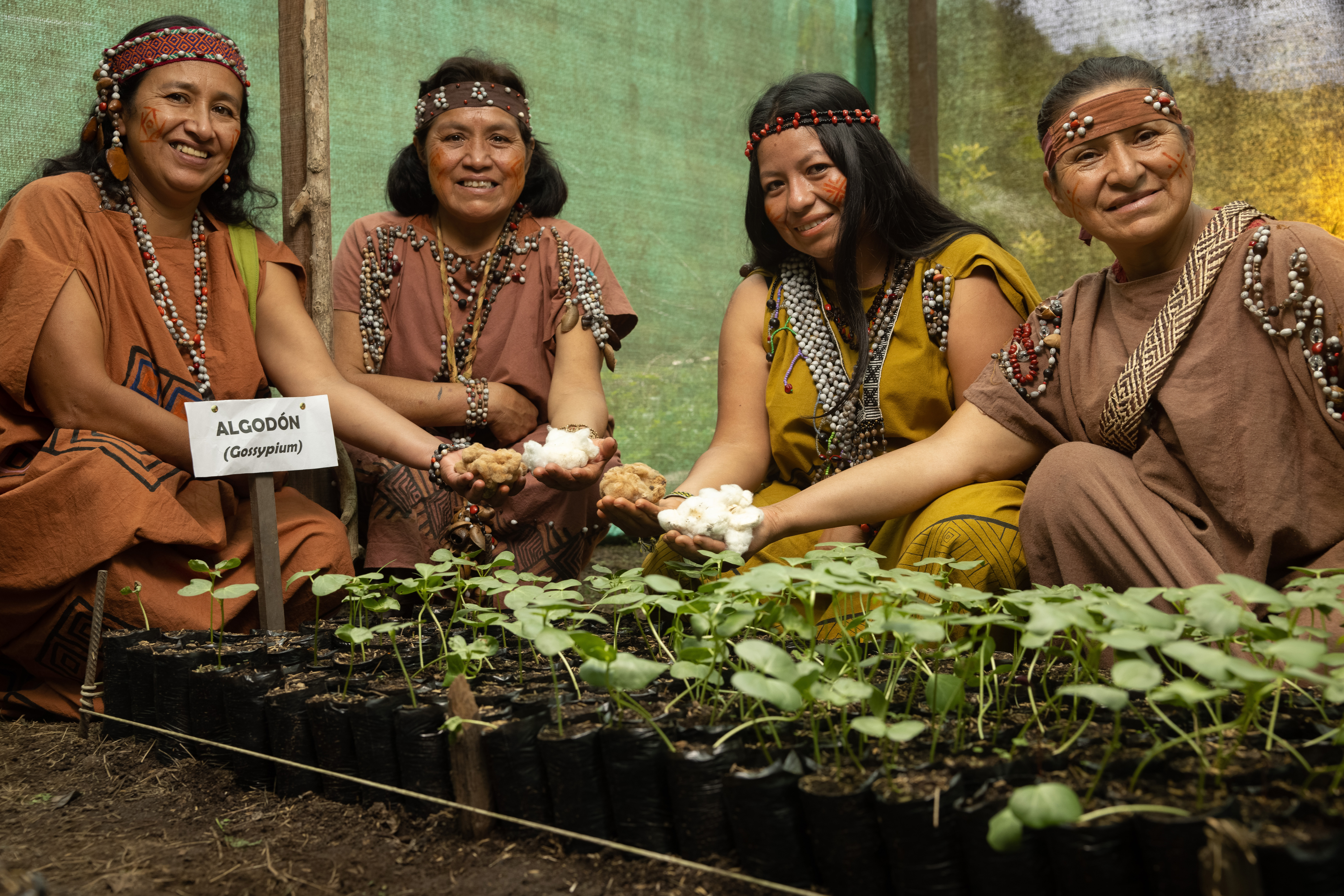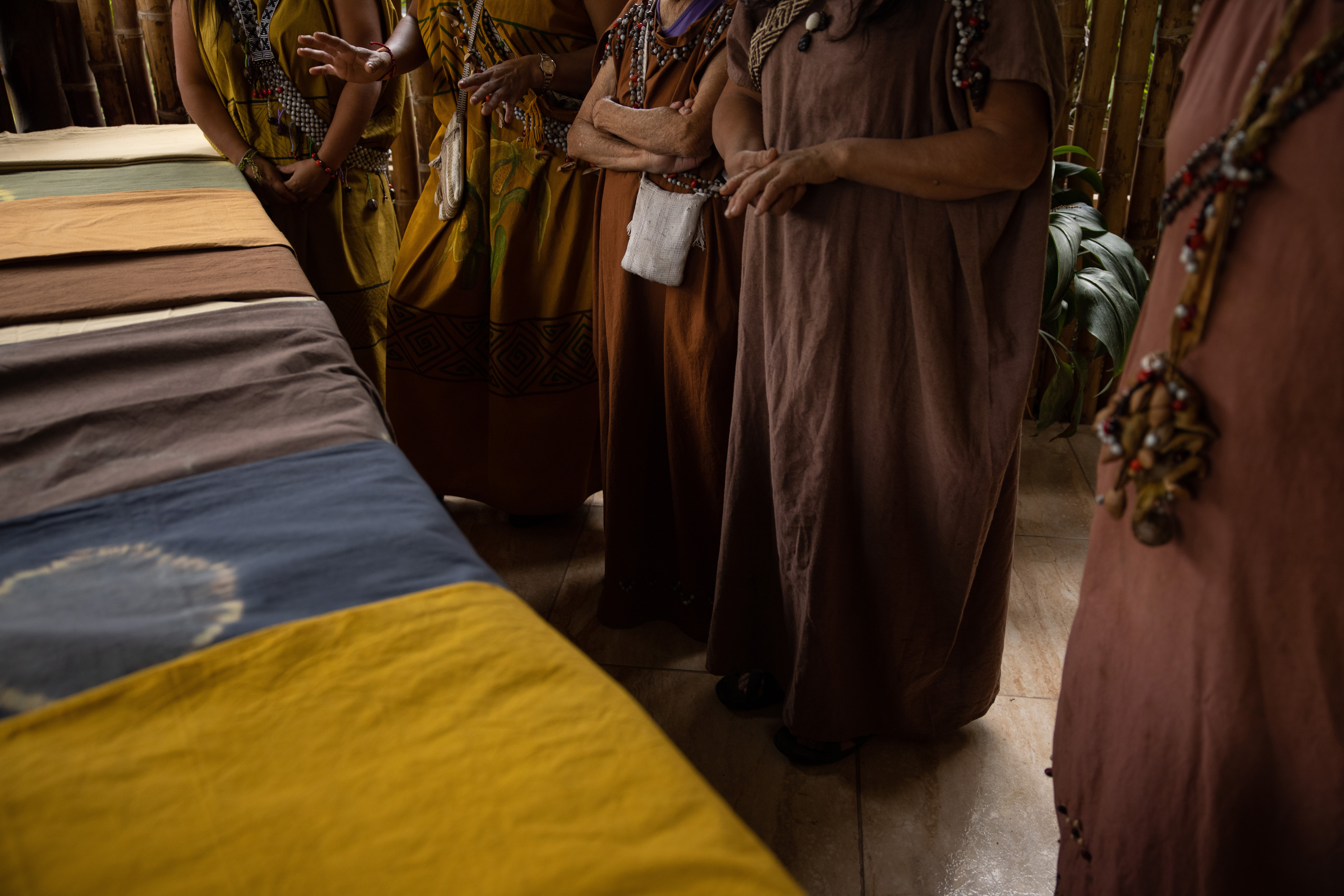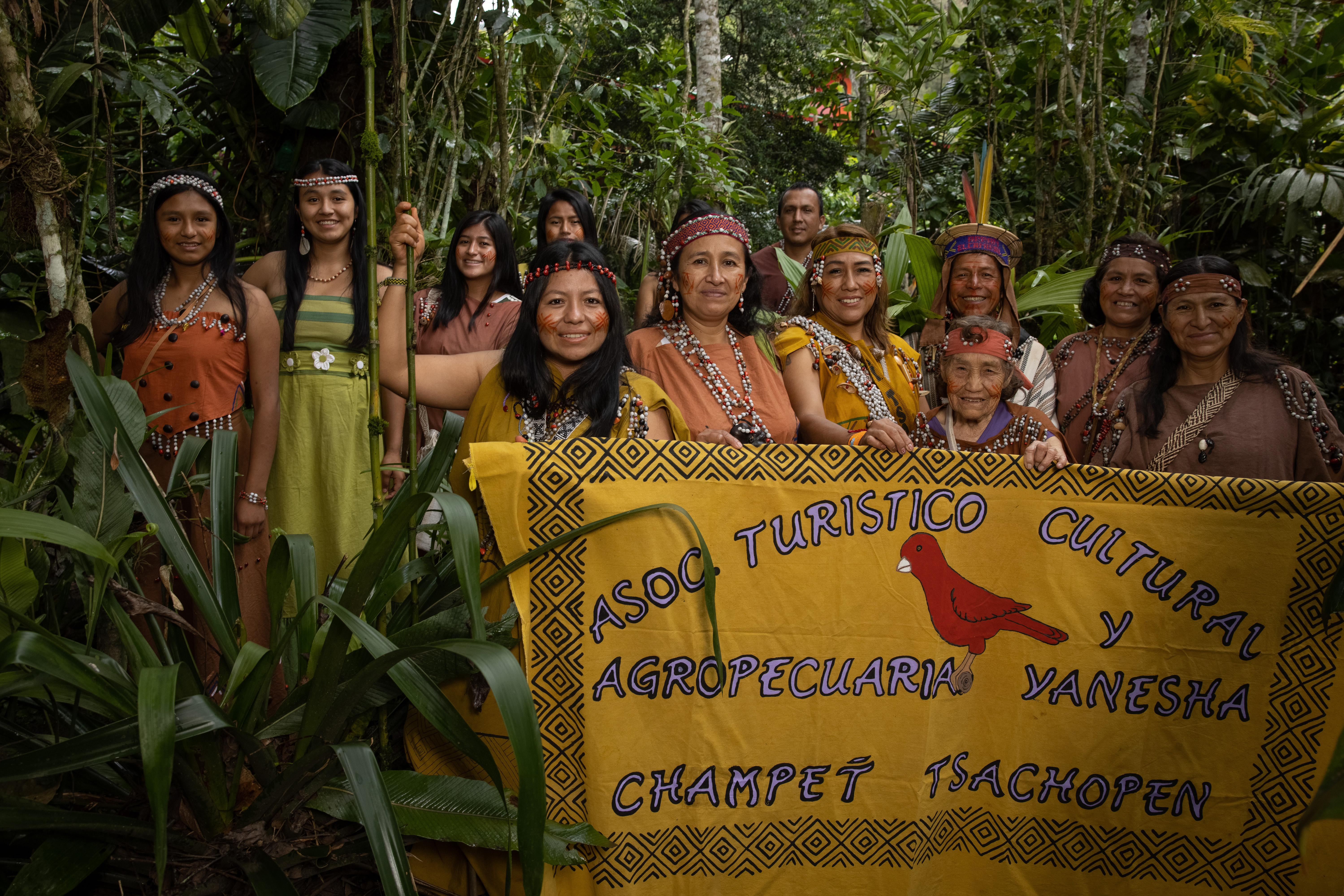Cecilia is very familiar with the challenges indigenous women face to become influential and gain more impact in spaces of leadership and decision making. Becoming an example of self-improvement for other yanesha women was the main reason that encouraged her to apply to Conservation International's Amazon Fellowhship Program.
We talked with Cecilia about her past project, and her motivation to apply for a second time to the program that seeks to train young Yanesha women leaders, and share her experience as a fellow of this program.

©Conservación Internacional / Marlon del Águila
Tell us about your previous project.
One of the problems faced by many associations led by women artisans located in communities near cities is that many forests have been lost; and with this, the raw material to produce jewelry and textiles. When the pandemic began, we realized that it was difficult and expensive to obtain the seeds, barks and roots that we use for the elaboration of our handicrafts and our cushmas (traditional clothing).
Throughout the last year, I have worked with two associations of Yanesha artisans collecting seeds to produce a nursery in the communites of Tsachopen and Ñagazú. Once these seedlings propagated in the nurseries, they were transplanted into the plots of each artisan woman so that they could access the necessary seeds and barks needed for the elaboration of their handicrafts.
What has been the reaction of the artisans?
The artisans are happy. I have recently visited their plots and I have noticed that they have provided for their necessary care. They have felt part of the whole process and are very pleased with what we have achieved. Some of the children are curious and want to know what the huairuro tree look like, or the huito, which is a fruit that is used a lot in the Yanesha iconography but have never seen the tree before.

©Conservación Internacional / Marlon del Águila
What would you highlight from the work done in the last year?
I have learned a lot about working as a collective. Working with women who have the willpower to continue learning, who seek to generate a better quality of life for their families and within their communities. I have learned about their craftwork, about the process and care for the elaboration of our fabrics. I am very happy and grateful to have worked with other Yanesha women.
How would you describe your experience in the Amazon Women Leaders Program?
It has been a beautiful experience. There was a lot of shared knowledge with the other leaders, and I am also very happy with the mentoring program because it has helped us to develop many soft skills. Sometimes it is difficult to be a woman in a federation mostly led by men, and to acquire decision-making power. It is necessary to change many things, but first we have to work on ourselves, and I thank our mentor, Lizeth Castilla and the program for her constant support and dedication.
In April you participated in the First Meeting of Indigenous Women Leaders in Quito. What was it like?
The experience in Quito was unique. It was my first international trip. I have met women who are leaders within their own federations and communities, and we all have a common goal: to protect nature.
I thought we were only 4 fellows within the program, four from Peru, but once in Quito I realized that there were 24 of us from the entire Amazon basin. I really liked the Colombian projects, and how Sharmaine Artist from Suriname is encouraging other women to produce their crops in a sustainable way whilst teaching techniques of waste management. The handicrafts of the Guyanese fellows that represent local wildlife, produced with shiringa, a vegetable resin also impressed me. It has been a memorable experience where we have all learnt from each other; they were very interested in the technique used by the Yanesha to produce our fabrics.

©Conservación Internacional / Marlon del Águila
You have been selected one more time by the program to lead a different initiative. What encouraged you to apply again?
Last year, my first thought for a project was to train future Yanesha women leaders, but back then I felt I did not have enough experience in mentoring, so I opted for the non-timber resources project. I thought it unlikely to receive the fellowship again, but also owed it to myself to try once more, just in case. It's something I had long been wanting to do and I didn't want to overlook it. I am really excited!
Tell us about the new initiative you will be working on this year.
In my experience working with indigenous communities, I have noticed that there are very few young women who are leaders or have professional training. Also, many Yanesha women go through pregnancies at a very young age and drop out of school.
I always wanted to work with women in the last years of high school and create a school for women leaders where we can work on self-esteem and provide them with tools for their personal development. I want to teach them about the opportunities they can find outside their community: to study, to apply for scholarships, to grow professionally, and show them that they don't have to remain in the shadows of men.
Why is this is important to you?
I am often invited to many workshops and events for women leaders, but it is always the same women who participate. It is important to pave the way and prepare the new generation so that, in the future, we will have more Yanesha women leaders. I can teach these girls and show them that they can achieve many things.
My greatest motivation has been my mother. Despite all the obstacles she went through, she had the courage to get ahead, and thanks to her support I was able to study. I am the first indigenous woman to have a professional degree in my family.
If I work with 10 or 15 young women, it would be great if they could all get a scholarship and get professional training. But even if 1 or 2 of them can make it, I'm sure this will make a difference. I want more girls to become professionals so that they can work for the benefit of their community, for their development.
What are your goals 5 years from now? What would you like to achieve?
I want to complete a master's degree. I am an agronomist, and I would like to continue working on climate change resilient activities. I would also like to be a leader equipped with the right tools and become an example for many other Yanesha women; show them that they can achieve their dreams as women, as a persons, and as professionals.

©Conservación Internacional / Marlon del Águila
About the Program
The Amazon Women Fellowship Program seeks to support socio-environmental enterprises of indigenous women in the Amazon, to develop and strengthen their leadership with a scholarship program, mentoring, peer-to-peer exchange and the creation of an integrated network among native communities. The program is an initiative of Conservation International and is supported by the French Government.
About Cecilia Martínez
Cecilia Martínez is coordinator of the technical team of the Federation of Native Yanesha Communities (FECONAYA). She is 33 years old and an agronomist by profession. She has been technical coordinator of 2 projects for the benefit of the Yanesha native communities, financed by UNDP and WWF and executed by FECONAYA.